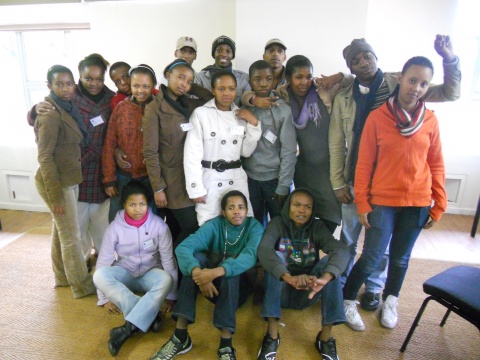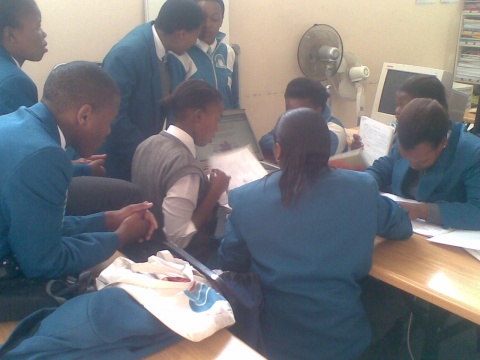
The Social Entrepreneurship class of 2010 (SECP2010) recently graduated from the Gordan Institute of Business Sciences (GIBS) and among the graduates was IkamvaYouth’s Gauteng Coordinator Andrew Barrett.
What’s more, Andrew’s Action Learning Project (ALP) about “Scaling IkamvaYouth” was awarded best ALP for 2010. An executive summary of this report is listed here and if you are interested you can download it at the bottom of this article.

Andrew Barrett congratulated by Prof. Nick Binedell for best ALP on GIBS SECP 2010.
Executive Summary:
IkamvaYouth is remarkable not just in what it does but also in how it does it and central to the success of the IkamvaYouth model (so far) is the grassroots democratic emphasis that provides all IkamvaYouth stakeholders (i.e. the learners, coordinators and volunteers) with the tools to actively influence and shape their organisation.
This introductory report focuses on the challenge of scaling IkamvaYouth to achieve maximum impact while honouring the values that IkamvaYouth believes in.
In looking for solutions to this challenge there are a number of interesting examples in the theoretical literature of alternatives to a traditional (hierarchical) top-down approach and of particular interest is the fascinating Brazilian for-profit company, Semco. The democratic workplace environment espoused by Semco and the impressive results it achieves provide practical pointers of a possible way to locate power and control in the IkamvaYouth structures that will remain true to its grassroots origins.
One potential solution to the IkamvaYouth scaling challenge is to franchise the IkamvaYouth model in a way similar to that done by Habitat for Humanity and in so doing ensure that power and control remain vested at the local branch level with autonomous structures pursuing the key IkamvaYouth objectives in a way that maintains IkamvaYouth’s impressive results within a pre-defined IkamvaYouth framework.
It also appears that pursuing a non-hierarchical approach means that a type of servant leadership is inevitable and, further, that a value-based democratic organisational structure seems to offer a highly attractive option that fits this bill. It seems certain that considerations of this kind would have multiple implications for the structuring of the organisation but perhaps the most fundamental movement required is a mind-shift away from the mainstream traditional hierarchical worldview in exchange for an approach that better reflects the integrity of IkamvaYouth as a truly grassroots organisation not only in name but in structure as well.
Click here: for the full report.

Learners are so excited about winter school. Please feel free to join this group on facebook: IkamvaYouth-makhaza winter school.
If you are interested in tutoring please contact me zukile@ikamvayouth.org
In the Business Day this week (7 June 2011), economist Peter Montalto finds inspiration in the aspirations of Ikamvanites. Montalto refers to his experience of visiting the Nyanga branch of IkamvaYouth a couple weeks ago and the impact this has had on his perspectives of South Africa and how important it is that we foster aspiration in our impoverished communities.
He writes,
In Nyanga, Ikamva Youth is working in the heart of the community in a local library. An army of enthusiastic volunteers, many of whom went through the project themselves, and a close connection with local universities provide the drive behind the project, and the energy comes from the leaders. Visiting the project, I saw young people hungry to learn, help each other and take advantage of the services Ikamva offers them. Most interesting, though, was that at its heart the work Ikamva is doing and the difference it makes is very simple — it is about providing a spark of hope, a path of opportunity and role models to look up to, all triggering aspiration.
The most basic tragedy of the townships is not even high unemployment (about 60% in Nyanga) or the conditions — it is a lack of aspiration. The encouraging thing, which Ikamva Youth has shown, is that though role models and simply providing information (and implicit incentives) about what options are available for youngsters and what they can achieve in life by putting the effort in at school, this aspiration can be ignited, grades can be improved and lives can be enriched. Once aspiration has been sparked, a basic entrepreneurial spirit in those who live in the townships causes a multiplier effect and youngsters then want to work hard, giving up time after school to be part of the programme, and so have a larger part in driving their own destiny. Much of Ikamva’s work relies on volunteers, who have been through the programme and then want to return to give something back.
I met Phillip and Thobela, two young people who had grown up in the township, been through the charity’s programme at school, got good enough grades to go to university, and now volunteer with the charity and are going on to great things. As an economist, I was delighted to find a common understanding with Phillip, who is passionate about econometrics. He is doing well at university and looking to go on to, for want of a better word, a “normal job” using his interest in statistics for the government or a company. Thobela, who now sits on Ikamva’s board, is passionate about chemistry. Getting into a good university allowed him to go on a study exchange to the US, and he now wants to become an academic teaching what he loves, a bug he has caught from his experience with the charity. Creating role models can become a virtuous cycle.
From my visit, I learnt many things. The issue of “untapped potential” is a much broader concept for SA than I first imagined. Government policy must be geared to providing the incentives and structure for personal aspiration of youngsters through mentoring and additional support in schools.
For the full article, visit http://www.businessday.co.za/articles/Content.aspx?id=145012

As Ikamvanites in grade 11 and grade 12 begin their mid-year exams, the “Each one Teaches one” campaign continues at the Makhaza branch today. Grade 11 learners (pictured below) are working together to improve their knowledge of life sciences as the exams rapidly approach.
Despite the fact that Friday is not one of our tutoring days, our grade 11s arrived in numbers to tutor themselves in the lab. We are expecting grade 12s to join them as their examinations commence as well. If you can come and help you more than welcome.
Big Up to them.
All the best Guys…








 Lloyd Lungu
Lloyd Lungu